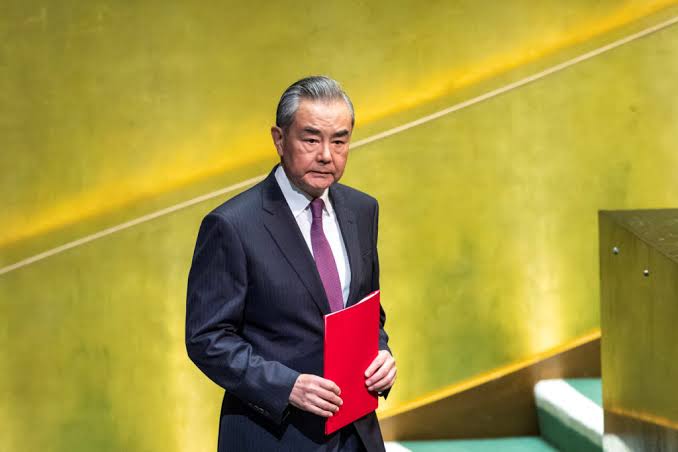Three days before China’s communist government marks its 75th anniversary, the country’s foreign minister delivered a strong message regarding the ongoing conflict between Russia and Ukraine. Speaking at the United Nations, China’s foreign minister urged global leaders to prevent the further expansion of the battlefield in the war.
China’s Stance on the Russia-Ukraine Conflict
This call for restraint reflects China’s ongoing commitment to diplomatic efforts aimed at finding a resolution to the conflict.
The foreign minister emphasized that China is dedicated to playing a constructive role in ending the war. He warned that other nations should refrain from “throwing oil on the fire” or using the situation to their advantage, a message that seemed to target the United States, without naming it directly. China’s position in the Russia-Ukraine war has always been cautious, often urging peace talks while maintaining close ties with Russia.
China’s foreign policy has long been centered on the idea of respecting national sovereignty, which was a key theme in the foreign minister’s speech. The nation continues to highlight its role as a mediator in the conflict, committed to shuttle diplomacy and maintaining open channels with both sides.
Peace Plans and China’s Role in Mediation
While China has not been directly involved in the military aspect of the Russia-Ukraine conflict, it has taken steps to propose peace initiatives. On the sidelines of the United Nations General Assembly, China and Brazil promoted their peace plan for Ukraine. This six-point plan calls for a peace conference involving both Ukraine and Russia, emphasizing the need to halt any expansion of the battlefield.
Though the plan has been met with skepticism from Ukrainian officials, several countries, particularly from Africa and Latin America, have expressed interest. These nations have formed a group called “friends for peace,” which aims to continue discussions on finding a peaceful solution to the conflict. China remains committed to supporting this group’s efforts, ensuring that each country retains control over its own policies.
China Warns Germany Over Provocative Taiwan Strait Passage
Despite these efforts, some world leaders question China’s neutrality due to its close relationship with Russia. However, China continues to frame its involvement as a mediator seeking to end the violence through dialogue rather than military intervention.
Broader Implications of China’s Speech
China’s foreign minister did not limit his remarks to the Russia-Ukraine war. He also spoke about China’s foreign policy regarding several other regions, including the Middle East and the Korean Peninsula, while touching on China’s long-standing commitment to national sovereignty. This commitment stems from China’s own history of conflicts over territory and its ongoing concerns over regions like Taiwan, Hong Kong, and Xinjiang.
One of the foreign minister’s key points was China’s insistence on a one-China policy, rejecting any notion of Taiwan being a separate entity from the mainland. According to China, the idea of “two Chinas” or “one China, one Taiwan” is not a possibility, and reunification with Taiwan is inevitable. This stance has been central to China’s foreign policy for decades and has influenced its relationships with other nations, particularly those that recognize Taiwan as an independent nation.
In addition to Taiwan, China addressed other sensitive areas, particularly human rights and its relationships with nations in the Middle East. On the topic of human rights, China reiterated that it has chosen its own path of development, one that suits its national circumstances. This is a response to ongoing international criticism regarding the treatment of ethnic groups like the Uyghurs and the handling of political dissidents in regions such as Hong Kong.
The foreign minister also expressed China’s continued support for Palestinian statehood, calling it “the biggest wound in human conscience.” He advocated for a two-state solution as the only way to resolve tensions in the Middle East, although he made no direct mention of Israel or the ongoing violence in that region.
Finally, when addressing the situation on the Korean Peninsula, China reaffirmed its position of seeking peace and stability. The minister expressed support for moving from an armistice to a peace agreement, ending the technical state of war between North and South Korea that has existed since the Korean War ended in 1953. He also warned against interference by countries outside the region, signaling China’s preference for regional players to take the lead in resolving tensions.
Throughout his speech, the foreign minister underscored China’s role as a mediator and its commitment to respecting national sovereignty, a principle that has been central to its foreign policy since the communist government was founded in 1949. China’s long history of dealing with issues of sovereignty, both within its own borders and in its relationships with other nations, continues to influence its approach to international conflicts.
Though the foreign minister’s speech did not introduce new policies or ideas, it reinforced China’s consistent stance on these key issues. As the conflict in Ukraine continues and tensions rise in various regions, China’s call for restraint and dialogue remains a crucial part of the global conversation. The challenge now lies in whether these diplomatic efforts will bear fruit in a world where the battlefield continues to expand.


